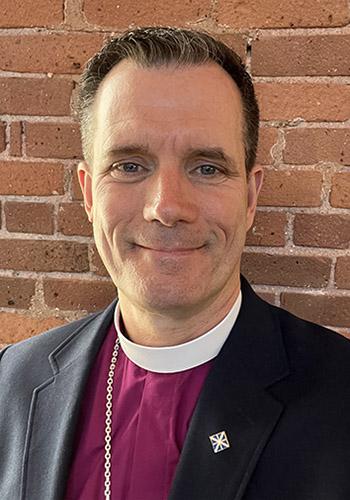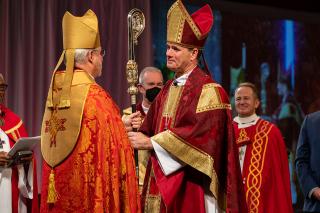Tell us about your profession.
I am the 16th Bishop Diocesan in the Episcopal Church in Connecticut. In the Episcopal Church, bishops are not appointed, but elected by the clergy and the people of the diocese. I was elected bishop on May 21 and was ordained and consecrated on October 15. I have oversight of all the congregations and communities in the Episcopal Church in Connecticut, which consists of the entire state.
How did you become interested in becoming a person of the Church?

I grew up in the church as a kid. Church was my safe place; it was where I felt seen and celebrated. There was a church camp where I grew up in Rhode Island and I attended this camp every summer for about 18 years, so church was really my home for most of my life. At seven years old, I knew I wanted to be a priest, and I would even "play church" at home, pretending to be a priest administering the sacrament.
I came out in college and this made me question my position in the Church. I actually left the Church for a bit, as young adults often do. During this period, I worked in a residential center for children with emotional and behavioral challenges. I then had similar positions in the Boston area, and was also the program director of BAGLY (Boston Alliance of Gay and Lesbian Youth).
I decided that getting an advanced degree would help further my career, so I applied to the Master of Social Work program at Simmons. It was an amazing experience. My first internship was at a psychiatric inpatient unit, and then I worked at Mass General in in-patient and later out-patient psychiatry.
Although I loved my work and my clients, I knew something was missing. I realized that I was indeed called to the priesthood. My husband was very supportive of me, and I went to seminary and got my Master of Divinity. I served in Cambridge and most recently at St. Paul's in Brookline.
What is it like to be consecrated as bishop?
It is surreal and overwhelming, yet also feels completely right and that I am in my own skin. I often think that I can't believe that this is my job. No matter how hard the work is at the end of the day I am grateful for the privilege.
What vision do you have for your diocese and the Episcopal Church?
I am a social worker, so I am spending time listening to people. Folks need to be seen and heard. I hope this will give me clarity for the next steps. This is a tough time to be in the Church, but I think that the Episcopal Church is especially well suited to meet the spiritual needs of people in this hard time in which we find ourselves. I want to offer a different narrative than what most people associate with a person of faith, or with the church as a whole.
How did your Simmons program in social work help prepare you for your commitment to the Church?
I often wonder how people can do ministry work without an MSW — there are so many parallels between ministry and social work. Perhaps most importantly, what you learn in an MSW program is that no one exists in isolation; people are parts of families, systems, communities, and institutions. You can't look at someone through just one lens, and this continues to be a critical tool for me in my current work.
The Simmons MSW has incredible breadth and depth. My clinical work prepared me to understand matters of mental health strategies for walking with people in their journey to wholeness. I can also talk about how policy affects individual lives. We do not live our lives in isolation, we are moving in the world. Simmons gave me this realization.
I did have a parishioner who was contemplating a career change, and I am proud to say that she is now a Simmons MSW alumna.
Do you have any advice for current students wanting to pursue a similar path?
The world needs you, whatever your passions, skills, and longings. I would say that God needs you to put all of your gifts forward. The world needs social workers, because they understand what is broken in this world. The world also needs ministers who can speak the Good News, tell new narratives and bear witness to the wonderful and God-given diversity of the world.
A degree in social work will serve you well in whatever vocation you embrace. It will give you a critical foundation for any kind of transformative work.

